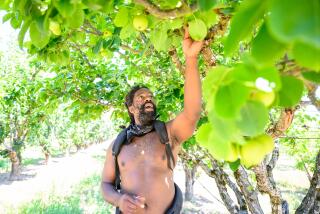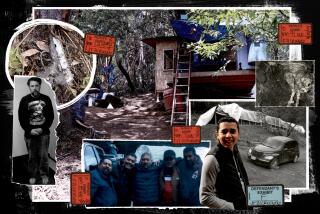Leader of the Path : Gary Farmer’s ‘Dead Man’ role as a guardian angel searching for his own roots is earning praise. He credits his own conflict as a Native American.
- Share via
The presence of actor Johnny Depp in the new Jim Jarmusch film, “Dead Man,” should sell some tickets this week. Those who plunk their money down will feel vindicated, too--Depp is very good in the film. However, anyone who sees “Dead Man” will surely come away with the face of Gary Farmer just as clearly etched in their memory.
Cast as Nobody, a kind of shamanic guardian angel who guides Depp through the perils of the Old West, Farmer is extraordinarily compelling in the part. Previously seen in Jonathan Wacks’ 1988 film, “Powwow Highway,” Farmer says the authenticity of his current performance is attributable to the fact that like Nobody, he’s had to struggle to reconnect with his roots.
Born in Ontario, Canada, on the Six Nations Reserve, the 42-year-old actor is Cayuga of the Wolf Clan, one of six tribes that comprise the Iroquois Nation. “I can trace my family at least as far back as the Revolutionary War, which is when my people settled in the area where I was born. But like Nobody, I was ripped away from my culture long before I was born,” Farmer explains during an interview at a Los Feliz restaurant.
A soft-spoken man with a daunting arsenal of information at his disposal, Farmer can reel off facts, figures and percentages concerning his people with ease. What makes him such a persuasive spokesman, however, is the intelligence and compassion that infuse his observations; he is a stunningly graceful presence.
“In the ‘20s and ‘30s many of our people were migrant workers, but when the Industrial Revolution kicked in most of them wound up working in the cities,” says Farmer, who has a younger sister who teaches dance. “My father was a crane operator who died at the age of 43 of cirrhosis and diabetes, and my mother was raised in the city because when her mother was growing up, she’d have been beaten in the residential schools if she spoke her native language. So, she came to believe it was important to teach her daughter to live like a white person.
“I too mostly grew up in the white world, but for me the white world and the native world have always been like two rivers that run side by side, but will never meet. Because I feel it’s my role to serve as a go-between, I have a foot in a canoe on each of these rivers, but that’s a precarious position to maintain. Part of the reason I’m in L.A. is to try and capitalize on the release of ‘Dead Man,’ but I feel ambivalent about that because I’m not interested in building some kind of following,” adds Farmer, who speaks tonight in Washington, D.C., at the National Museum of the American Indian, which is presenting a program of films he directed.
“I’ve had many opportunities to move here and devote myself to acting, but I’m far more interested in working with my own people,” says the actor, who’s editor in chief of Aboriginal Voices, a quarterly magazine devoted to Native American culture.
“People feel sorry for us, but white guilt is the last thing we need--it’s time to move on, and part of what we’re trying to do is develop our own media outlets so we can control the images presented about us,” adds the actor, who’s currently shooting a documentary on corn and has several other scripts he hopes to produce. “The movie industry is responsible for most of the misperceptions people have about Native Americans, and that isn’t changing at all. As an actor I’m constantly asked to do things that aren’t accurate to our traditions--and if these points aren’t negotiable, I simply leave the film.”
Farmer’s acting career began in 1975 after three years spent studying communications and photography at Syracuse University and Ryerson Polytechnical Institute. He was 22 when he left school, and he devoted the next 10 years to working in theater.
His career took a dramatic turn in 1987 when Jonathan Wacks gave him the lead in “Powwow Highway”--a part Farmer says he got “because there aren’t many Native American actors. We haven’t had the opportunities most Americans have--most Native Americans lack the self-esteem required to pursue this work, and many Native Americans don’t want to be a part of this industry. To go into the white man’s world and have success goes against all kinds of beliefs.”
On the set of “Powwow Highway” Farmer met Jean Stawarz, who co-wrote the film’s script. They married in 1988 and for the next five years lived on an isolated parcel of land between Montreal and Toronto. In 1994, the launching of Aboriginal Voices took over Farmer’s life, however, and he found himself working 70-hour weeks in the magazine’s Toronto office. Nine months ago he and his wife split up and, Farmer says, “for now I’m kind of homeless.”
“The publishing industry is the toughest business I’ve ever worked in, and at this point the magazine is a full-time job for me. We’re trying to expand and are thinking about opening an office in Santa Fe, where I’m also interested in starting a theater group,” adds Farmer, who will host a benefit screening of “Dead Man” in Toronto on Thursday, with all profits going to Aboriginal Voices.
Farmer clearly has his work cut out for him, but he feels ready to tackle whatever comes his way. “I used to be embarrassed when I saw my people in the cities drunk in the streets, but I now realize they foreshadowed a situation that’s come to afflict all cultures. What’s happening now is you’re all becoming Indians, and are all experiencing things we’ve lived with for 200 years. The oppression we’ve known is visible everywhere now, as we witness the decline of white domination.
“The Native American community is in a major state of healing and is experiencing a creative rebirth, but it’s also incredibly confused. There are orthodox people who follow sacred and traditional ways, and there are people making a million dollars a year--the dichotomy in our community is overwhelming.
“A critically important part of this healing process is the fact that, although there’s a machismo in Indian males that’s pretty much unrivaled in any other culture, the matriarchal roots of our community grow stronger every day,” he says. “In fact, I’ve come to believe that all the power for change lies with white women, especially in America. That power shift makes this a fascinating time to be alive.”
More to Read
Only good movies
Get the Indie Focus newsletter, Mark Olsen's weekly guide to the world of cinema.
You may occasionally receive promotional content from the Los Angeles Times.










